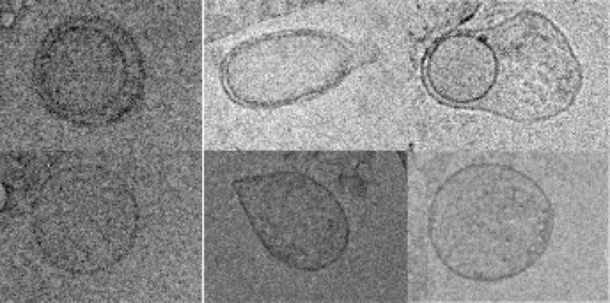
Cyro-TEM images of isolated extracellular vesicles (EVs).
New non-invasive biopsy method for cancer diagnosis focus of $2.3M NIH grant
September 25, 2018
UNIVERSITY PARK, Pa. — Development of a non-invasive liquid biopsy that enables cancer detection and monitoring even when tissue samples are scant or unavailable is the focus of a five-year, $2.3 million National Institutes of Health grant.
The primary investigator for the grant is Siyang Zheng, associate professor of biomedical engineering and electrical engineering. The proposed study will develop a new technology for non-invasive cancer diagnosis through blood assay. The technology is enabled by a nanomaterial and its integration into a microdevice to isolate tiny vesicles released by cells. The cargo of the vesicles contains DNA and cancer-related DNA mutations that can be detected by sensitive DNA sequencing.
Early and accurate molecular diagnoses are critical to extend cancer patient survival. In this proposed study, Zheng and his team will develop a new liquid biopsy method. Via this method, EGFR and KRAS mutations and ALK translocations can be detected from non-small lung cancer patients.
These genes are important for therapeutic efficacy of some targeted therapies. Therefore, the proposed technology can predict therapeutic efficacy for precision medicine.
“Sensitive detection of cancer mutations from blood can also enable prognosis, early diagnosis, and repetitive treatment monitoring,” Zheng said.
Included in Zheng’s team of investigators are Justin Pritchard, assistant professor of biomedical engineering; Chandra P. Belani, Miriam Beckner Distinguished Professor of Medicine, Penn State Cancer Institute; Jiangang Liao, professor, Penn State College of Medicine; Istvan Albert, professor of biochemistry and molecular biology; and Yuan Wan, assistant professor of biomedical engineering, The State University of New York at Binghamton.



